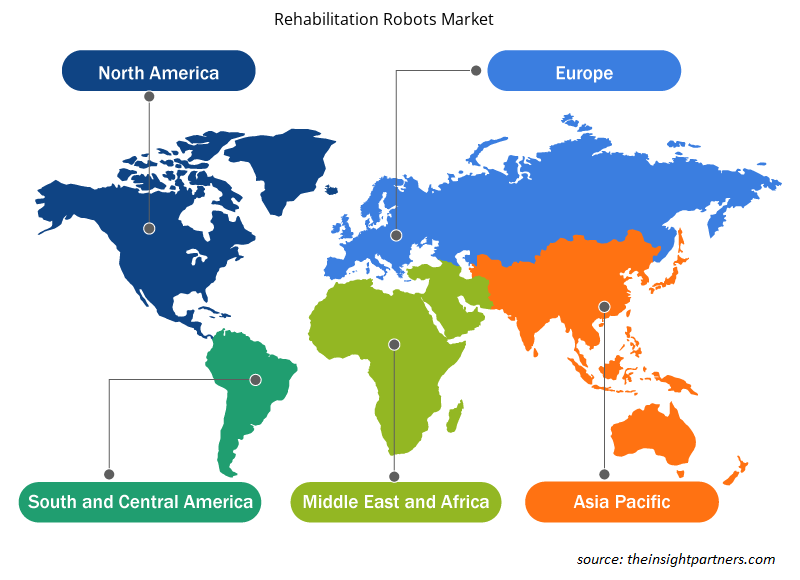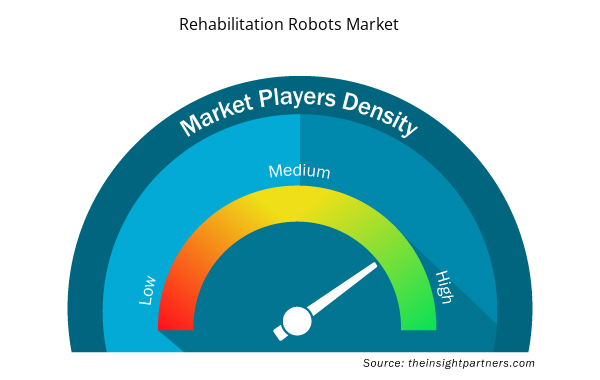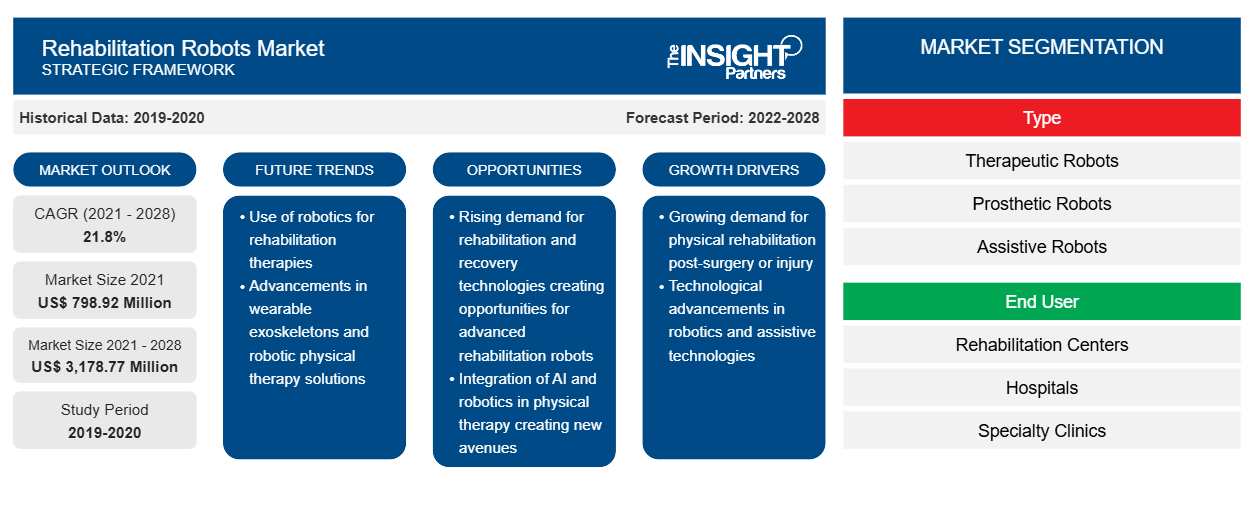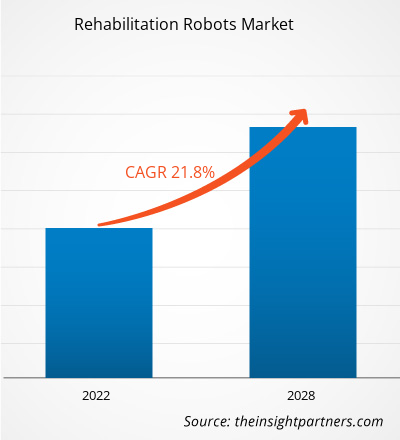Der Markt für Rehabilitationsroboter wurde im Jahr 2021 auf 798,92 Millionen US-Dollar geschätzt und soll bis 2028 3.178,77 Millionen US-Dollar erreichen; von 2021 bis 2028 wird ein durchschnittliches jährliches Wachstum von 21,8 % erwartet.
Rehabilitationsroboter werden im Genesungsprozess behinderter Patienten beim Aufstehen, Gleichgewicht und Gehen eingesetzt. Diese Roboter müssen mit den Menschen und ihren Bewegungen Schritt halten; daher müssen die Hersteller bei der Herstellung der Maschine sicherstellen, dass sie mit den Fortschritten des Patienten Schritt hält. Der Markt für Rehabilitationsroboter dürfte in den kommenden Jahren aufgrund von Faktoren wie dem Anstieg der geriatrischen Bevölkerung, Schlaganfällen und robotergestütztem Training in der Rehabilitationstherapie ein deutliches Wachstum verzeichnen. Die hohen Kosten der Geräte behindern jedoch das Marktwachstum.
Markteinblicke
Passen Sie diesen Bericht Ihren Anforderungen an
Sie erhalten kostenlos individuelle Anpassungen an jedem Bericht, einschließlich Teilen dieses Berichts oder einer Analyse auf Länderebene, eines Excel-Datenpakets sowie tolle Angebote und Rabatte für Start-ups und Universitäten.
- Holen Sie sich die wichtigsten Markttrends aus diesem Bericht.Dieses KOSTENLOSE Beispiel umfasst eine Datenanalyse von Markttrends bis hin zu Schätzungen und Prognosen.
Anstieg der geriatrischen Bevölkerung, Schlaganfall und robotergestütztes Training in der Rehabilitationstherapie
Mit dem Wachstum der Forschung im Bereich Rehabilitationsrobotik steigen die Herstellung und der Einsatz therapeutischer Rehabilitationsroboter weltweit. Japan und China gehören zu den Ländern im asiatisch-pazifischen Raum mit einer hohen Zahl älterer Menschen. Diese Länder sowie andere Entwicklungsländer in der Region erleben Fortschritte in der Medizintechnik. Laut dem Ministerium für Innere Angelegenheiten und Kommunikation waren 2017 in Japan etwa 35,2 Millionen Menschen 65 Jahre oder älter, und diese Zahl soll bis 2020 auf 36,2 Millionen ansteigen. Daher sind große Unternehmen im Gesundheitssektor bereit, in die Entwicklung fortschrittlicher Technologien zur Pflege der älteren Menschen in der Region zu investieren. Daher gehören die zunehmende Zahl älterer Menschen und die zunehmende Zahl von Schlaganfällen, die Menschen bewegungsunfähig machen, zu den wichtigsten Faktoren, die die Nachfrage nach Rehabilitationsrobotern antreiben.
Bei der Rehabilitationstherapie mit Robotern wird ein hochintensives Training für Patienten mit motorischen Störungen aufgrund von Erkrankungen des Rückenmarks oder Schlaganfällen durchgeführt. Laut den Centers for Disease Control and Prevention (CDC) ist der Schlaganfall eine der häufigsten Ursachen für schwere langfristige Behinderungen in den USA. Müdigkeit, Hemiparese und Gehschwierigkeiten sind einige der Folgen eines Schlaganfalls. Darüber hinaus bieten Rehabilitationsroboter Patienten, die von einem Schlaganfall oder anderen nicht fortschreitenden Hirnläsionen betroffen sind, ein maßgeschneidertes, aufgabenorientiertes, lang anhaltendes, intensives, standardisiertes und reproduzierbares Training. Die steigende Nachfrage nach besseren und schnelleren Gesundheitsdiensten treibt also das Wachstum des gesamten Marktes für Rehabilitationsroboter voran.
Typ-Einblicke
Der Markt für Rehabilitationsroboter ist nach Typ in Therapieroboter, Assistenzroboter, Exoskelettroboter und Prothesenroboter unterteilt. Das Segment der Exoskelettroboter hatte 2021 den größten Marktanteil und wird im Prognosezeitraum voraussichtlich die höchste durchschnittliche jährliche Wachstumsrate verzeichnen.
Endbenutzer
Basierend auf dem Endnutzer ist der Markt für Rehabilitationsroboter in Krankenhäuser, Rehabilitationszentren und Fachkliniken unterteilt. Das Segment der Rehabilitationszentren hatte 2021 den größten Marktanteil und wird im Prognosezeitraum voraussichtlich die höchste durchschnittliche jährliche Wachstumsrate verzeichnen.
Die Akteure auf dem Markt für Rehabilitationsroboter verfolgen in großem Umfang eine Produktinnovationsstrategie, um der sich weltweit ändernden Kundennachfrage gerecht zu werden und so ihren Markennamen weltweit zu wahren.
Regionale Einblicke in den Markt für Rehabilitationsroboter
Die regionalen Trends und Faktoren, die den Markt für Rehabilitationsroboter im Prognosezeitraum beeinflussen, wurden von den Analysten von Insight Partners ausführlich erläutert. In diesem Abschnitt werden auch die Marktsegmente und die Geografie für Rehabilitationsroboter in Nordamerika, Europa, im asiatisch-pazifischen Raum, im Nahen Osten und Afrika sowie in Süd- und Mittelamerika erörtert.

- Erhalten Sie regionale Daten zum Markt für Rehabilitationsroboter
Umfang des Marktberichts zu Rehabilitationsrobotern
| Berichtsattribut | Details |
|---|---|
| Marktgröße im Jahr 2021 | 798,92 Millionen US-Dollar |
| Marktgröße bis 2028 | 3.178,77 Millionen US-Dollar |
| Globale CAGR (2021 - 2028) | 21,8 % |
| Historische Daten | 2019-2020 |
| Prognosezeitraum | 2022–2028 |
| Abgedeckte Segmente | Nach Typ
|
| Abgedeckte Regionen und Länder | Nordamerika
|
| Marktführer und wichtige Unternehmensprofile |
|
Marktteilnehmerdichte für Rehabilitationsroboter: Auswirkungen auf die Geschäftsdynamik verstehen
Der Markt für Rehabilitationsroboter wächst rasant, angetrieben durch die steigende Nachfrage der Endnutzer aufgrund von Faktoren wie sich entwickelnden Verbraucherpräferenzen, technologischen Fortschritten und einem größeren Bewusstsein für die Vorteile des Produkts. Mit steigender Nachfrage erweitern Unternehmen ihr Angebot, entwickeln Innovationen, um die Bedürfnisse der Verbraucher zu erfüllen, und nutzen neue Trends, was das Marktwachstum weiter ankurbelt.
Die Marktteilnehmerdichte bezieht sich auf die Verteilung der Firmen oder Unternehmen, die in einem bestimmten Markt oder einer bestimmten Branche tätig sind. Sie gibt an, wie viele Wettbewerber (Marktteilnehmer) in einem bestimmten Marktraum im Verhältnis zu seiner Größe oder seinem gesamten Marktwert präsent sind.
Die wichtigsten auf dem Markt für Rehabilitationsroboter tätigen Unternehmen sind:
- Bionik Laboratories Corporation
- Cyberdyne Inc.
- Ekso
- Bionics Holdings Inc
- Rewalk Robotics GmbH
Haftungsausschluss : Die oben aufgeführten Unternehmen sind nicht in einer bestimmten Reihenfolge aufgeführt.

- Überblick über die wichtigsten Akteure auf dem Markt für Rehabilitationsroboter
Nach Typ
- Exoskelett-Roboter
- Therapeutische Roboter
- Assistenzroboter
- Prothesenroboter
Endbenutzer
- Rehabilitationszentren
- Krankenhäuser
- Spezialkliniken
Nach Geografie
- Nordamerika
- UNS
- Kanada
- Mexiko
- Europa
- Vereinigtes Königreich
- Deutschland
- Frankreich
- Italien
- Spanien
- Restliches Europa
- Asien-Pazifik
- China
- Japan
- Indien
- Australien
- Südkorea
- Restlicher Asien-Pazifik-Raum
- Naher Osten und Afrika
- Vereinigte Arabische Emirate
- Saudi-Arabien
- Südafrika
- Restlicher Naher Osten und Afrika
- Süd- und Mittelamerika
- Brasilien
- Argentinien
- Restliches Süd- und Mittelamerika
Firmenprofile
- Bionik Laboratories Corporation
- Cyberdyne Inc.
- Ekso Bionics Holdings Inc
- Rewalk Robotics GmbH
- Hocoma Ag
- Rehab-Robotik-Unternehmen Limited
- Kinova Inc
- Rex Bionics GmbH
- Toyota Motor Corporation
- Myomo Inc
- Historische Analyse (2 Jahre), Basisjahr, Prognose (7 Jahre) mit CAGR
- PEST- und SWOT-Analyse
- Marktgröße Wert/Volumen – Global, Regional, Land
- Branche und Wettbewerbsumfeld
- Excel-Datensatz



Report Coverage
Revenue forecast, Company Analysis, Industry landscape, Growth factors, and Trends

Segment Covered
This text is related
to segments covered.

Regional Scope
North America, Europe, Asia Pacific, Middle East & Africa, South & Central America

Country Scope
This text is related
to country scope.
Häufig gestellte Fragen
Bionik Laboratories Corporation, Cyberdyne Inc., Ekso Bionics Holdings Inc, Rewalk Robotics Ltd, Hocoma Ag, Rehab-robotics Company Limited, Kinova Inc, Rex Bionics Ltd, Toyota Motor Corporation, Myomo Inc among Others. are some of the major players in the Rehabilitation Robots market.
Rehabilitation robots assist handicapped people in regaining their ability to stand, balance, and walk. Because these robots must keep up with a human's movement, the machine's designers must ensure that the machine will be consistent with the patient's development.
The growth of the market is attributed to the Factors driving the market growth include the rise in geriatric population, stroke and robot-assisted training in rehabilitation therapy. However, high cost of the devices to hinder the market growth.
Trends and growth analysis reports related to Life Sciences : READ MORE..
The List of Companies - Rehabilitation Robots Market
- Bionik Laboratories Corporation
- Cyberdyne Inc.
- Ekso
- Bionics Holdings Inc
- Rewalk Robotics Ltd
- Hocoma Ag
- Rehab-robotics Company Limited
- Kinova Inc, Rex Bionics Ltd
- Toyota Motor Corporation
- Myomo Inc.
The Insight Partners performs research in 4 major stages: Data Collection & Secondary Research, Primary Research, Data Analysis and Data Triangulation & Final Review.
- Data Collection and Secondary Research:
As a market research and consulting firm operating from a decade, we have published and advised several client across the globe. First step for any study will start with an assessment of currently available data and insights from existing reports. Further, historical and current market information is collected from Investor Presentations, Annual Reports, SEC Filings, etc., and other information related to company’s performance and market positioning are gathered from Paid Databases (Factiva, Hoovers, and Reuters) and various other publications available in public domain.
Several associations trade associates, technical forums, institutes, societies and organization are accessed to gain technical as well as market related insights through their publications such as research papers, blogs and press releases related to the studies are referred to get cues about the market. Further, white papers, journals, magazines, and other news articles published in last 3 years are scrutinized and analyzed to understand the current market trends.
- Primary Research:
The primarily interview analysis comprise of data obtained from industry participants interview and answers to survey questions gathered by in-house primary team.
For primary research, interviews are conducted with industry experts/CEOs/Marketing Managers/VPs/Subject Matter Experts from both demand and supply side to get a 360-degree view of the market. The primary team conducts several interviews based on the complexity of the markets to understand the various market trends and dynamics which makes research more credible and precise.
A typical research interview fulfils the following functions:
- Provides first-hand information on the market size, market trends, growth trends, competitive landscape, and outlook
- Validates and strengthens in-house secondary research findings
- Develops the analysis team’s expertise and market understanding
Primary research involves email interactions and telephone interviews for each market, category, segment, and sub-segment across geographies. The participants who typically take part in such a process include, but are not limited to:
- Industry participants: VPs, business development managers, market intelligence managers and national sales managers
- Outside experts: Valuation experts, research analysts and key opinion leaders specializing in the electronics and semiconductor industry.
Below is the breakup of our primary respondents by company, designation, and region:

Once we receive the confirmation from primary research sources or primary respondents, we finalize the base year market estimation and forecast the data as per the macroeconomic and microeconomic factors assessed during data collection.
- Data Analysis:
Once data is validated through both secondary as well as primary respondents, we finalize the market estimations by hypothesis formulation and factor analysis at regional and country level.
- Macro-Economic Factor Analysis:
We analyse macroeconomic indicators such the gross domestic product (GDP), increase in the demand for goods and services across industries, technological advancement, regional economic growth, governmental policies, the influence of COVID-19, PEST analysis, and other aspects. This analysis aids in setting benchmarks for various nations/regions and approximating market splits. Additionally, the general trend of the aforementioned components aid in determining the market's development possibilities.
- Country Level Data:
Various factors that are especially aligned to the country are taken into account to determine the market size for a certain area and country, including the presence of vendors, such as headquarters and offices, the country's GDP, demand patterns, and industry growth. To comprehend the market dynamics for the nation, a number of growth variables, inhibitors, application areas, and current market trends are researched. The aforementioned elements aid in determining the country's overall market's growth potential.
- Company Profile:
The “Table of Contents” is formulated by listing and analyzing more than 25 - 30 companies operating in the market ecosystem across geographies. However, we profile only 10 companies as a standard practice in our syndicate reports. These 10 companies comprise leading, emerging, and regional players. Nonetheless, our analysis is not restricted to the 10 listed companies, we also analyze other companies present in the market to develop a holistic view and understand the prevailing trends. The “Company Profiles” section in the report covers key facts, business description, products & services, financial information, SWOT analysis, and key developments. The financial information presented is extracted from the annual reports and official documents of the publicly listed companies. Upon collecting the information for the sections of respective companies, we verify them via various primary sources and then compile the data in respective company profiles. The company level information helps us in deriving the base number as well as in forecasting the market size.
- Developing Base Number:
Aggregation of sales statistics (2020-2022) and macro-economic factor, and other secondary and primary research insights are utilized to arrive at base number and related market shares for 2022. The data gaps are identified in this step and relevant market data is analyzed, collected from paid primary interviews or databases. On finalizing the base year market size, forecasts are developed on the basis of macro-economic, industry and market growth factors and company level analysis.
- Data Triangulation and Final Review:
The market findings and base year market size calculations are validated from supply as well as demand side. Demand side validations are based on macro-economic factor analysis and benchmarks for respective regions and countries. In case of supply side validations, revenues of major companies are estimated (in case not available) based on industry benchmark, approximate number of employees, product portfolio, and primary interviews revenues are gathered. Further revenue from target product/service segment is assessed to avoid overshooting of market statistics. In case of heavy deviations between supply and demand side values, all thes steps are repeated to achieve synchronization.
We follow an iterative model, wherein we share our research findings with Subject Matter Experts (SME’s) and Key Opinion Leaders (KOLs) until consensus view of the market is not formulated – this model negates any drastic deviation in the opinions of experts. Only validated and universally acceptable research findings are quoted in our reports.
We have important check points that we use to validate our research findings – which we call – data triangulation, where we validate the information, we generate from secondary sources with primary interviews and then we re-validate with our internal data bases and Subject matter experts. This comprehensive model enables us to deliver high quality, reliable data in shortest possible time.


 Holen Sie sich ein kostenloses Muster für diesen Bericht
Holen Sie sich ein kostenloses Muster für diesen Bericht